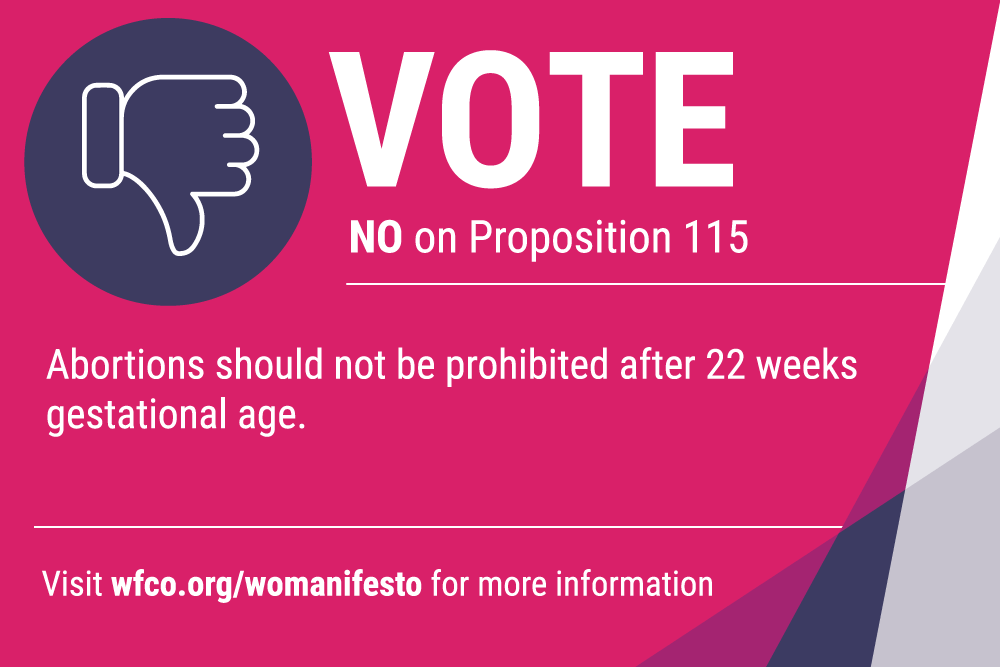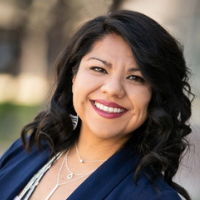
No on Prop. 115: Prohibiting Abortions After 22 Weeks
Guest Blog: Keep Politics out of Personal Medical Decisions
Cynthia Molina is the CEO of Boulder Valley Women’s Health Center. BVWHC was founded in 1973 as the first abortion clinic in Colorado. Since then, they’ve expanded to provide a wide variety of reproductive and sexual healthcare services for people of all genders, including birth control, annual exams, screenings for breast and cervical cancer, STI testing, transgender hormone therapy, a free Teen Clinic, and more.

Imagine finding out the worst on your 20-week ultrasound
Imagine being pregnant and going for your 20-week ultrasound. You’re happy, excited, you’ve made it through the first trimester when most miscarriages happen. Then, you receive the devastating news that your fetus has no brain or has another anomaly that is incompatible with life. Continuing the pregnancy might even jeopardize your own health and future childbearing ability. What do you do? You have a difficult and heart-wrenching decision to make, but if you live in Colorado, at least the decision is yours.
Proposition 115 would take this decision out of the hands of women, families, and doctors. It would ban abortion after 22 weeks of pregnancy, except when the pregnant woman’s life is in immediate danger.
Proposition 115 inserts politics into personal medical decisions
Proposition 115 would take this decision out of the hands of women, families, and doctors. It would ban abortion after 22 weeks of pregnancy, except when the pregnant woman’s life is in immediate danger. It includes no exceptions for risks to her health, for a lethal fetal diagnosis, or in cases of rape. In short, it inserts politics into personal medical decisions.
The vast majority of abortions, nearly 90%, are performed in the first 12 weeks of pregnancy. Abortions after 22 weeks are rare, accounting for about 1% of all abortions in the U.S. Abortions later in pregnancy are serious medical procedures that are very expensive and difficult to access. (Only one physician in Colorado and only a handful in the country performs abortion at this stage.) If a pregnancy progresses to 22 weeks, it is most often a wanted pregnancy. And if someone seeks an abortion at this stage, there’s a reason.
For Rabbi Joe Black and his wife Sue, that reason was a fetal diagnosis of Tay-Sachs disease, a fatal and incurable condition. As Colorado residents, they had the ability to obtain an abortion later in pregnancy. For another woman, Robin, it was when her fetus suffered a stroke in utero at 34 weeks. “There was no surgery or medicine that could have fixed her or saved her,” she said.
Christina Taylor, who learned her fetus had no kidneys or bladder, says, “I am endlessly grateful to live in Colorado where there were no laws standing in my way to make the most difficult time in my life harder.” Recently, U.S. Senator Gary Peters (D-MI) and his wife, Heidi, shared their story of ending a second-trimester pregnancy and the obstacles they encountered, even though continuing the pregnancy was endangering Heidi and there was no chance of fetal survival.
I am endlessly grateful to live in Colorado where they were no laws standing in my way to make the most difficult time in my life harder.
Newspapers across the state encourage Coloradans to vote no on 115
No Coloradan should have their medical options restricted or have to leave the state to access the health care they need. Backers of this abortion ban admit it is a foot in the door to banning all abortion in our state, as they have tried to do three other times in the past 12 years. But dictating personal health decisions goes against Colorado values, which is why the Denver Post and other newspapers around the state, numerous medical experts, faith leaders, elected officials and community organizations, and over 150 women who have had abortions later in pregnancy have spoken out against this ban.
Trust women and families to make their own personal decisions around pregnancy. Vote NO on 115.
The Women’s Foundation of Colorado opposes Proposition 115. To learn more about our position, read our ballot guide, The Womanifesto.
The Women’s Foundation of Colorado is a nonpartisan organization. The opinions of guest bloggers are their own and do not necessarily reflect the opinions or positions of The Foundation.

